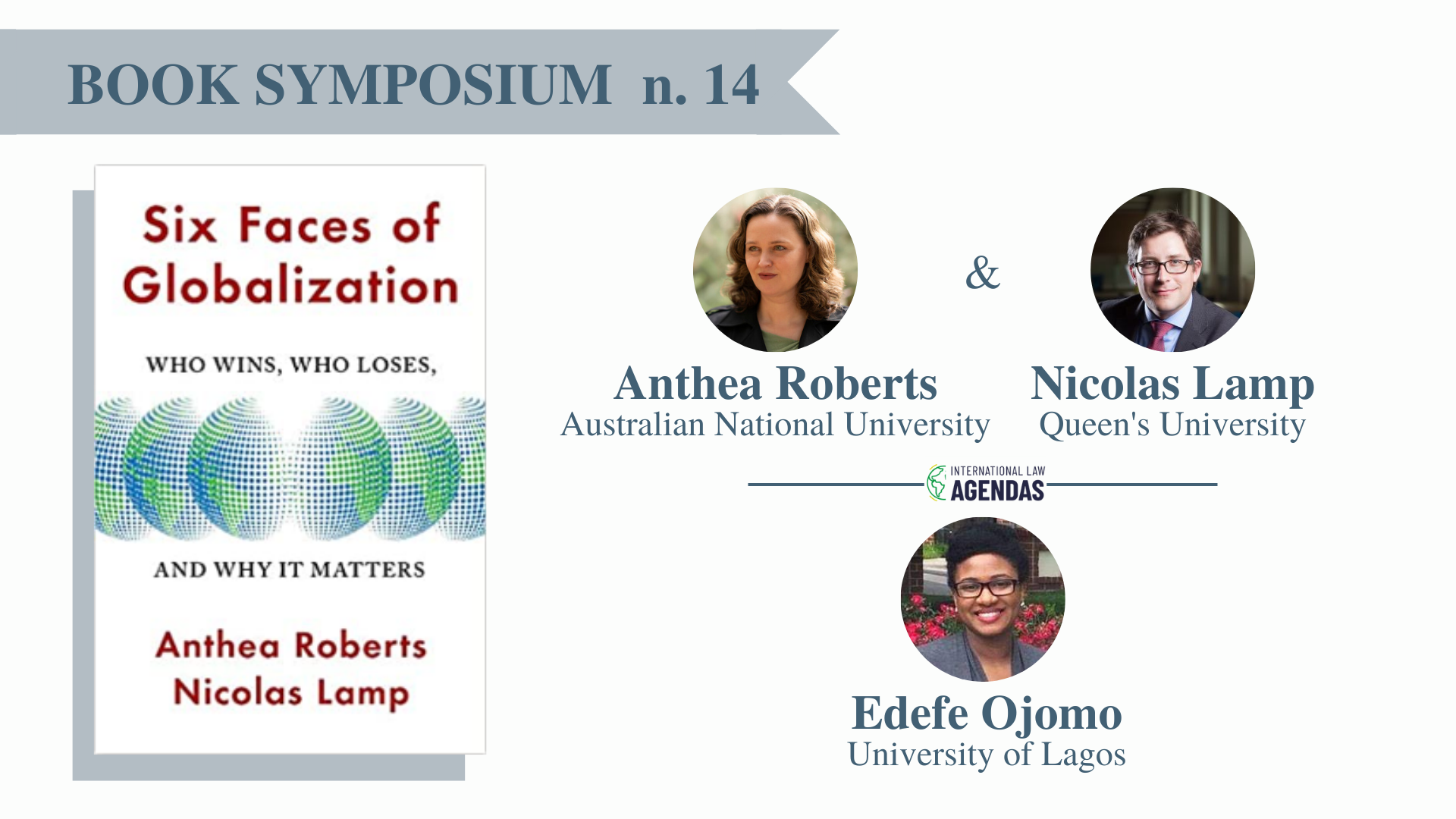Using narratives as a tool to weave together the different perspectives on globalization and demonstrate their advancement, Roberts and Lamp reveal how the manifestation of winners and losers shapes these narratives. But, they do not dispel the existence of non-Western narratives, which they explore in brief, in a further attempt to underscore the boundaries of the six faces. Roberts and Lamp, through their analysis, identify perceived winners and losers of globalization in each narrative and explain how the narratives can be used to pursue the political and economic agendas of their advocates. In this review, I wish to add narratives about globalization that are common across the African continent, as a means to test the purchase of Roberts and Lamp’s account.
The six perspectives comprising the Rubik’s cube adopted by Roberts and Lamp are the establishment narrative; the left wing populist narrative; the corporate power narrative; the right wing populist narrative; the geoeconomics narrative; and the global threats narrative. Narratives from other regions of the world that they identify are: the neocolonial narrative; Asia-rising narratives; narratives on Western hegemony; and the left behind narrative. This review starts with a discussion of the “other” narratives that underpin the African response to globalization, mainly the neocolonial, the Western hegemony and the left behind narratives.
Since the mid-twentieth century when African countries achieved independence, their main political objective has been state consolidation as a means to ward off colonialism and preempt neocolonialism. State consolidation represents attempts at building self-sustaining institutions that constitute the state as a representative entity of its citizens with positive and negative sovereignty to effectively control its internal affairs and participate actively in external affairs, while protecting itself from adverse incursions. Thus, external interventions, introduced under the rubric of trade liberalization and globalization, have been regarded as neocolonial measures to keep African states bound to foreign powers and markets. According to the neocolonial narrative, “developed countries have used international law and international institutions to perpetuate the quasi-colonial domination of developing countries in the spheres of international trade, investment and finance” (p. 222). Self-reliance was a big part of the African economic narrative during the immediate post-colonial period, as seen in many of the regional economic integration treaties. This approach led to a focus on import substitution industrialization policies in some countries in the 1960s and 1970s; by the 1980s, the failure of these policies created a pathway to the adoption of neoliberal policies designed and introduced by the Bretton Wood institutions to liberalize trade and build competitive markets. As in the Western Hegemony narrative, which sees the West as forcing a universal system of rules on all countries, usually through international financial institutions (IFIs), the shift to trade liberalization and privatization is seen to have benefitted African elites and created a new layer of wealth and culture, leaving the majority of the populations in poverty and further disengaged from the state and its institutions. Consequently, IFIs are recognized as global purveyors of a neocolonial agenda to impede state consolidation, engendering western hegemony and leaving many behind. As African states struggle through the adoption of a medley of liberal economic and political policies to consolidate statehood at home and abroad, the “left behind” narrative, claiming that globalization is structured and implemented to benefit some while others are left behind, is disseminated alongside the neocolonial and Western hegemony narratives to explain why African economies have not experienced the kind of exponential growth that was promised would accompany the prescribed policies. At the core of the African narrative is the idea of exploitation, suppression and humiliation that has inhibited the state consolidation that is necessary for proper participation in the global economy. So far, putting the globalization cart before the state consolidation horse has led to a posture of distrust and frustration, which underlies the African perspective on the six Western faces of globalization identified in the book.
The establishment narrative endorses globalization as an overall productive phenomenon with gains for all, in the long term—as long as the rewards are properly harnessed. For many Africans, this narrative has generally been an external one concocted and peddled by Western states and institutions to the detriment of third world states in general. The historical decline in the political and economic conditions of African states and the majority of their citizens has further stimulated support for the anti-establishment perspective.
The left wing populist narrative can be regarded as an extension of the skepticism with which Africans have viewed globalization and its by-products. This narrative sees globalization as creating an economy that is made up of “takers and makers”. During the ”Occupy…” protests that erupted globally in the early 2000s, African youths took to the streets to make political statements against governments seen to introduce oppressive economic conditions and policies. A protester during the Occupy Nigeria protests articulated the situation quite plainly: “Why does everything boil down to the masses? Why should we suffer for the mistakes of the government?” While focus is on the domestic acceptance and implementation of liberal economic policies, the left wing populist narrative sees the state as complicit in maintaining the bifurcation, and the African narrative, sees the state as a site of bifurcation.
The right wing populist narrative focuses on the outflow of jobs to foreigners, and it differs from the left wing narrative in that it is outward looking, seeing globalization as a “foreigner’s game” that enables foreign workers to steal local jobs (p. 79). The African narrative is somewhat different, because there has been a struggle to build and sustain local industries and local jobs for majority of the population, so Africans and non-Africans have not always struggled for the same jobs. Instead, regional integration has been the focus of ire, leading in some cases to mass deportations of other Africans, like the removal of Ghanaians from Nigeria in the early 1980s, and the more recent outcry against the influx of Nigerians into Ghana, and against Nigerians and Zimbabweans into South Africa, leading to serious social upheavals and xenophobic attacks. Thus, the outward-looking focus of the right wing populist narrative remains key, but in the African case, it has been targeted more at regional integration, a sub-set of globalization.
The corporate power narrative, similarly to the left wing populist narrative, takes an interesting turn in the African case. While the Western narrative sees big multinational corporations, agents of globalization, as the major threat to fairness and equitable income distribution, the African narrative sees corporate power as an extension of colonial subjugation. The history of colonialism shows how corporate interests have been a core part of the invasion of Africa and its economic subjugation. As Roberts and Lamp note, corporations possess bargaining leverage, legal entitlements and market power, which makes them more powerful than many countries, while they use the power of their home countries to achieve their aims through public means (p. 100).
The geoeconomics narrative has a strong African pull, given the role of China in African development over the past few decades. The African perspective relates Chinese intervention to the unequal and unfair political and economic relationship between African countries and Western countries. So, the rise of China has generally been regarded as a good thing, creating a balance of power needed for African states to exercise a strengthened position domestically and an inspiration for developing countries through a focus on south-south cooperation.
The global threats narrative alludes to the manner in which the interconnectivity that makes globalization so attractive becomes the reason why it is so destructive. Two points to note about the African response to the global threats narrative. First, African states represent a rather negligible footprint on the global economic and environmental carpet. Therefore, they have been disinclined to pay a price that appears much higher than their impact and contribution to the risk portfolio. Second, African states suffer an additional burden of isolation when they experience these threats, which exposes them to neglect and further exclusion from a global economy that they continue to struggle to feature in. The travel bans that followed the West African Ebola epidemic in 2014 and the discovery of the Omicron variant of COVID-19 in South Africa in 2021 provide examples of this. Consequently, the global threats narrative can sometimes seem like melodrama to African states who consider that they are in a constant free fall and a constant state of shock and, thus, somewhat impervious to intermittent shocks.
Team Africa has not always partaken in the beneficial aspects of the globalization game, and as it seeks to meet the requirements for entry, whether they be standard-setting or regulatory requirements, the rules keep changing. African states have also been involved in some level of narrative switching, for example when they claim that standards requirements for climate change will keep them from developing their economies sufficiently to compete, bringing the global threats narrative/analysis to the national level. Nevertheless, African states have usually succumbed to Western policies that have landed them in precarious positions, with their citizens and with the global community, leading to crippling debt burdens that further impede economic development and state consolidation.
Generally, African states and publics seek better rules and more amenable implementation of globalization. As noted in the New International Economic Order almost half a century ago, African countries seek a global economic order in which “the prosperity of the international community as a whole depends upon the prosperity of its constituent parts”. What Roberts and Lamp have done is provide a useful framework for constructing and interpreting perspectives on globalization by acknowledging different “constituent parts”. While their analysis applies to the parts of the world they are familiar with, it is also helpful as a tool for African and other non-Western scholars to challenge existing narratives and present our perspectives by constructing contextual narratives.
See Roberts and Lamp’s reaction
-

Edefe Ojomo is a lecturer in the Department of Jurisprudence and International Law at the University of Lagos, Nigeria.





